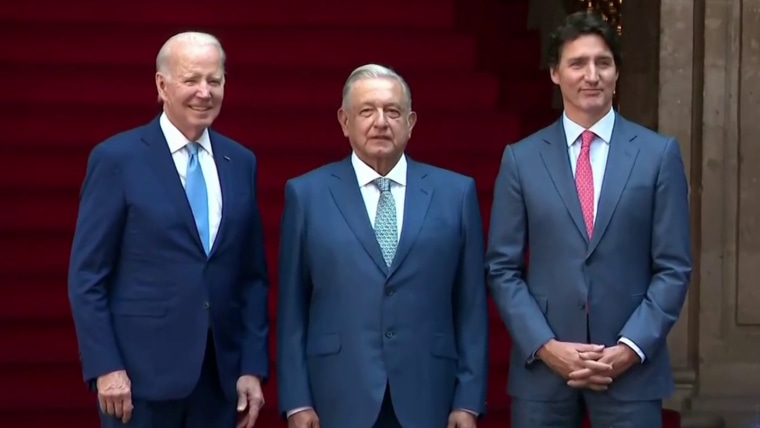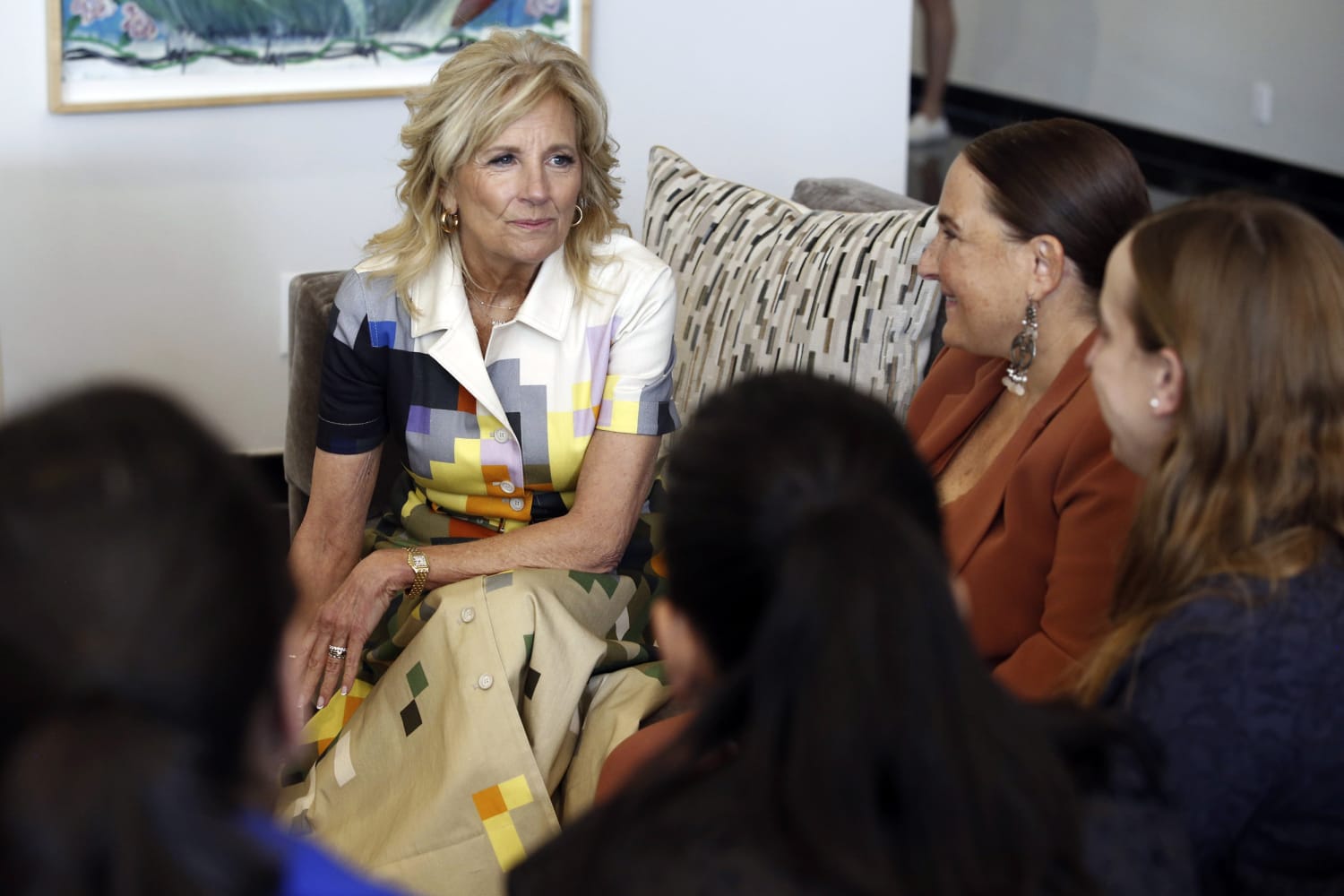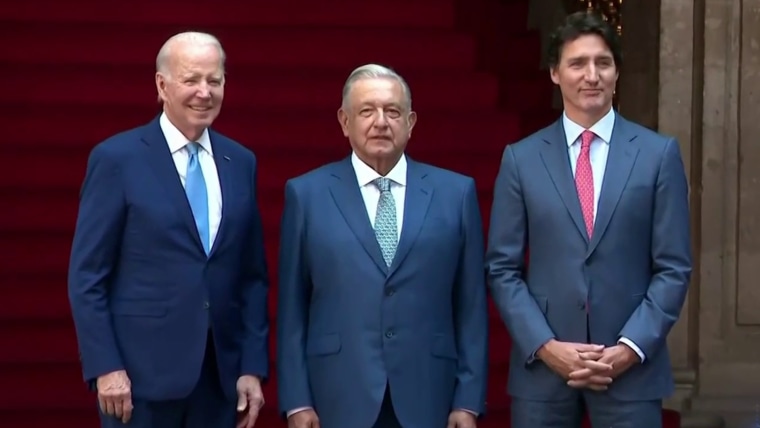MEXICO CITY — As the leaders of the U.S., Mexico and Canada huddled this week to talk trade, drugs and migration, one first lady employed a quieter form of diplomacy to make the case for democracy and individual rights.
A running theme of Jill Biden’s appearances in Mexico City this week was that democracy and political freedoms are worth saving — at a time when Mexico and nations around the world are seeing some democratic traditions beginning to erode.
“Freedom of faith, of speech, of the press, is the foundation of democracy and that the voice of the people can never truly be silenced,” she told a group of high school students at a literacy event on Monday, highlighting the “shared understanding” in the U.S. and Mexico.
Her husband, President Joe Biden, often warns that democracy is more fragile than Americans might believe, giving speeches warning of extremist forces bent on unraveling the country’s democratic foundation.
But democratic norms are also under assault in Mexico. Foreign policy analysts warn that President Andrés Manuel López Obrador’s populist leadership style is developing an authoritarian hue. They cite his attempts to overhaul a respected national institute whose job is to ensure free, competitive elections.
Jill Biden’s schedule made clear her intentions. She sought out forums that celebrated acts of individual self-expression — the sort of freedoms that authoritarian governments look to trample.
On Monday, she spent an hour with a group of entrepreneurs at a women’s empowerment event at the residence of the U.S. ambassador to Mexico, Ken Salazar, in Mexico City. Scrunched together on couches, she admired the paintings that one woman showed her on a cellphone. “We have never been silent; but women have been silenced,” she told the guests in opening remarks.
At the literacy event, she sat and listened as poets read their work and musicians sang the Beatles’ “Strawberry Fields Forever,” in a mix of English and Spanish.
She promoted the deep cultural ties between the U.S. and Mexico, making the point that the neighboring countries share more than separates them.
At an event sponsored by the National Football League, she watched a group of school children move through flag football drills, high-stepping through a collection of tires. She singled out a 9-year-old girl who plays running back and called her up to the lectern.
“This is really empowering young girls and it’s teaching all children the values of respect and integrity,” she said. (Asked by a reporter afterward about the injuries and health crises in NFL football, she said, “Well … ,” and walked on).
“She’s just a unique asset and a unique resource,” said David L. Cohen, the U.S. ambassador to Canada who was in Mexico City for the summit. “She moves the needle on all topics on which she engages, every time she is out there.”
Biden’s appearance at the two-day summit reflects her complementary role as first lady. She amplifies her husband’s message and delivers it, perhaps, in moments when it might be awkward for him to do so.
Heading into the summit, some analysts had hoped Joe Biden would call attention to the backsliding in Mexico’s democracy. A record number of journalists have been killed in Mexico. An index of the world’s democracies had downgraded Mexico from a “flawed democracy” to a “hybrid regime.”
The country’s democracy isn’t dead, but it is “grievously ill,” wrote Denise Dresser in Foreign Affairs magazine last year.
“We have to find a way to clean up the brutal campaign against journalists in Mexico,” Eric Farnsworth of the Council of the Americas and the Americas Society told reporters ahead of the North American Leaders’ summit. “This has to be a high priority. It has to change.”
“We look at these things through the security lens, the immigration lens, and the economic lens,” he continued. “But we also have to remember we are three strong, important democratic neighbors and that has to be ultimately what undergirds our relationship.”
Coaxing López Obrador to stand up for democratic institutions wasn’t Joe Biden’s priority. Instead, he took the opposite tact. In brief public remarks before a joint meeting with López Obrador on Monday, Biden said he wanted to “compliment” him for building “democratic institutions in this hemisphere.”
Diplomacy always involves tradeoffs. Biden may not have wanted to offend López Obrador when the U.S. needs him to dismantle drug cartels and ease the migration crisis at the border.
Jill Biden has a different role. She speaks about issues important to the Biden administration — but also issues that mean something to her personally. Democracy is one. In a speech in Ecuador last year, she said that “we are connected, especially in the Americas. If one nation is vulnerable to authoritarianism or a health crisis or poverty, it won’t be long before those same problems reach us all. But when nations here in South America embrace democracy, you become the living proof that government can deliver for the people they represent.”
Her remarks in Mexico City weren’t aimed at the Mexican leadership, according to her office.
“The first lady continues to be a trusted messenger for the administration’s priorities and values at home and abroad,” said Vanessa Valdivia, Jill Biden’s press secretary. “During her visit to Mexico, she highlighted our strong partnership and shared values with Mexico and Canada.”
Not that diplomacy as practiced by Jill Biden can’t also be fun.
As she waited behind the lectern to give remarks at the ambassador’s home, Salazar’s 5-year-old granddaughter approached her and asked a question. The first lady later revealed to the guests what it was: “Where is Joe Biden?”
“I get that a lot!” she said, to laughter.
Source: | This article originally belongs to Nbcnews.com










